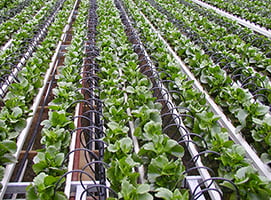In the 1920s when the young Zionist engineer Simcha Blass emigrated from Warsaw to Mandate Palestine, he couldn’t have known the future would bring a worldwide crisis in water scarcity. Nor did he suspect the global impact his innovations would have on the future of farming. What he did know was that for Israel to exist as the Jewish homeland — with its few rivers and mostly arid climate — it needed smart water management.
Upon arriving, Simcha got to work, designing the Jordan Valley’s first modern aqueduct and founding the water company Mekorot, which remains Israel’s national water company to this day. As Mekorot’s director, Simcha became a leading force in an emergency operation to respond to early proposals of Britain’s partition plan, which excluded the Negev from Israel’s borders. In partnership with the Jewish National Fund, the Jewish Agency and the Haganah, the team’s audacious plan aimed to establish 11 settlements in the Negev in a single night. To pull off such a massive undertaking Simcha purchased the pipes that had been used to extinguish London’s fires during The Blitz in World War II. It worked: Overnight the pipeline was laid and on October 6, 1946 the world woke to an undeniable Jewish presence in the south, complete with running water. As planned, the presence of the 11 communities had a major influence on what became the United Nations Partition Plan for Palestine.
Still, Simcha’s lasting global legacy was yet to come. Wandering a farm in the Negev one day, he came upon an inexplicable sight: among a clump of malnourished trees, one tree grew tall. Examining the situation, he discovered a tiny leak in a nearby machine. From that leak, small but consistent droplets of water were fully nourishing the tree. In that moment modern drip irrigation was born. Through testing Simcha realized that, compared to flood irrigation, localized drops significantly decrease the amount of water needed to grow crops while also increasing yields. What’s more, fertilizer and other additives can also be controlled, keeping excess from leaking into the ground and damaging the surrounding environment.
Thanks in large part to Simcha, today the Negev is not only a part of Israel, but is a wellspring of modern agricultural practices that are copied all over the world. And because farmers in over 100 countries use Simcha’s drip irrigation system, which is still manufactured by his company Netafim out of Kibbutz Hatzerim, thousands of gallons of water are saved every single day.



